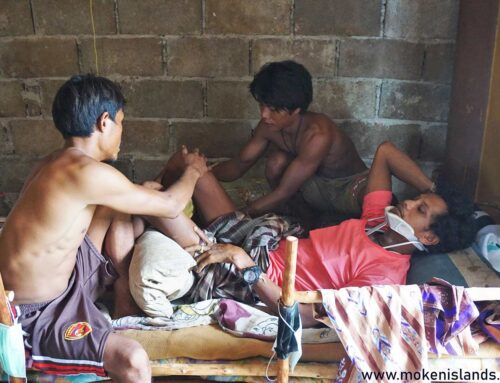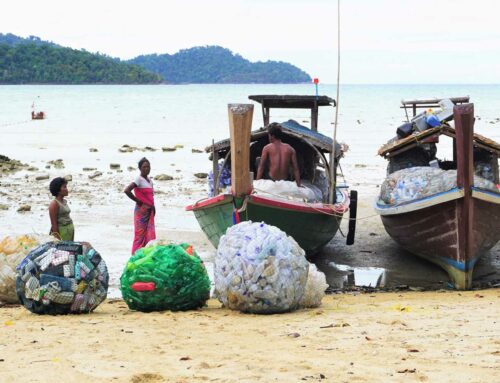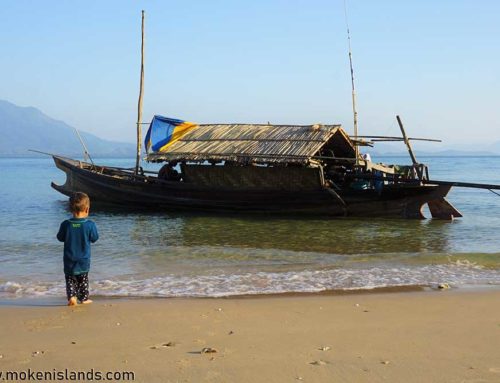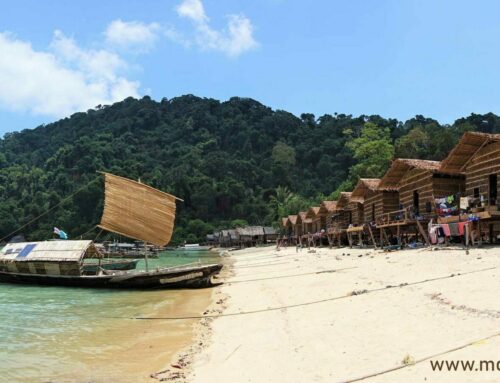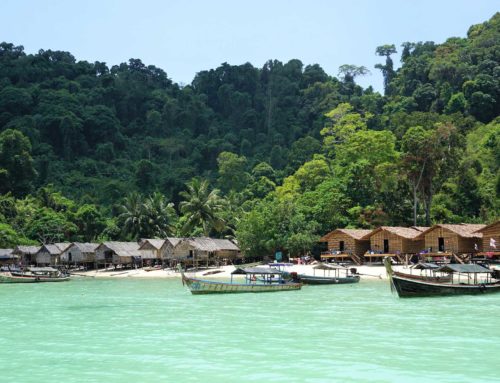Reflecting ahead
The following reflections were inspired by the questions asked through an interview by Biliana Boneva, a journalist from Bulgarian National Television:
Hooks Reflections:
Introducing myself:
My name is Hook I am Moken. My parents saw the changes coming for the Moken and they felt the need to teach us both cultures. So, I grew up attending Thai school on the mainland while also learning the way of life of the Moken, living on the Kabang. I have seen the differences in the cultures. Although I carry both cultures in me, I lean more towards the Moken culture. There is a lot of freedom in the Moken way of life. There is a freedom of movement that allows for a natural curiosity to live anywhere along the coast and the islands. I have enough experience to live of the bounty of the sea. Anything that cannot be found in the ocean, such as rice or oil, can be exchanged with shells and fish.
Who are the Moken people?
We are freedivers and can live off the ocean, we live on boats and in freedom. We don’t dominate places and don’t worry. However, in present days Moken no longer live on boats, but our diving skills remain intact and so does our sense of freedom.
What is my connection to the Ocean?
The ocean gives everything for life. She is creator and destroyer, the source of birth and death. She is mother and home.
What is our greatest danger?
It is the vanishing of our culture and way of life. Bigger cultures tend to dominate small cultures. Without the culture there will be no more Moken people.
What is our daily life on the Kabang?
Our son usually wakes us up before the sun rises. After a cup of fresh coffee and a small breakfast, we usually move the Kabang to where we want to spend the morning/day. Our boat is small and the things we are dependent on is: food and fresh water. We have an icebox on the boat which makes life so much easier as you can store vegetables and meat we buy every time we have access to a market. Fresh fish is plenty around the ocean but fishing once every three days instead of fishing every day adds a level of freedom to our movement. But the ice only lasts so long. Being around the tourists areas it is sometimes possible to get a bag full of ice from the speedboats before they go home. All these necessities define our movements throughout the day. Without the option of going to a restaurant a decent amount of time is spend preparing two fresh meals a day. We have also started to engage in community empowerment, helping to build infrastructures that support the Moken way of life. So we spend time in the different Moken communities but mainly on Surin to find out what is needed. Towards the late afternoon it is nice to be in a place with running fresh water to take a shower. While any time during the day it is possible to cool off in the ocean, it is nice and necessary to take a fresh water shower at the end of the day. With our water storage on the boat we can spend three days without refilling our tanks, but showering in a beautiful remote bay with a running stream of clear water from the jungle mountain feels like one of life’s greatest luxuries.
Lenas Reflections:
I am a German woman married to a Moken man and understand my role as being a cultural bridge towards other western cultures. Being fluent in different languages, it is easy for me to answer questions about the Moken providing a cultural context. Often people ask about my personal involvement and I never know how visible the bridge should be. I always feel that the Moken have so many more pressing issues to talk about. I understand that being invisible won’t get anyone across the river. But if I am too visible then no one will cross either. People will get stuck on the bridge…
Who are the Moken people to me?
The Moken people to me are people who belong. The question of belonging has been part of my life as I find little meaning the modern world of material consumption and social media. The Moken people to me embody the natural human connection to their environment and to their people. When they were asked where they were from they would answer that they are from the Moken – belonging to a culture to a people, to a way of life that has always been connected to the ocean but never to a specific place.
As I learn more about their culture by taking part in their way of life I notice that greed is connected to material wealth and is something new to their culture. If everyone uses what exists in plentitude in the natural world of rich biodiversity then there is nothing to be greedy about. If you need something you just go and get it. If you are lacking the tools or skills to get it you can borrow from someone who has the skills or tools available. You can either offer something in return that is based on your skill or tools or not. Having access to finances with which you can buy everything you ever needed creates a split, creates desire, creates greed.
Just imagine a world without greed…
So this culture, to me, belongs in this world. It does not harm anyone, it does not create malice and greed, it sees things as they are without discrimination or ignorance. It is inspired by the most beautiful thing in the world: healthy, thriving and diverse nature. A deep respect for the life of every living thing lives in this culture.
What we are doing now:
We are working on ways to keep the cultural knowledge among the Moken, while looking into possibilities of including Moken knowledge in the school curriculum. For this we are dependent on donations to pay salaries to Moken elders to teach the old Moken songs, the making of the old fishing tools, such as the three pointed “choom” the spear for shallow water fishing. We also currently have a request going to build one more Kabang the traditional way. Whereas in the old days people would just join forces, nowadays the only way that the group of men needed to build the Kabang can take the time off is to get salaries and cover material costs.
Furthermore the global trash problem is a local problem on the Surin islands as well. There are many kilos (if not tons) of floating plastic being washed ashore that we are currently finding salaries for the Moken to go around the remote bays to pick up ocean trash to transfer it to recycling stations on the mainland. At the moment we have a group of five Moken to collect plastics around the islands. These salaries are also dependent on donations. If you would like to support our initiatives, please visit our donation page or read more on our project page.
Lena Bumiller-Klathale





